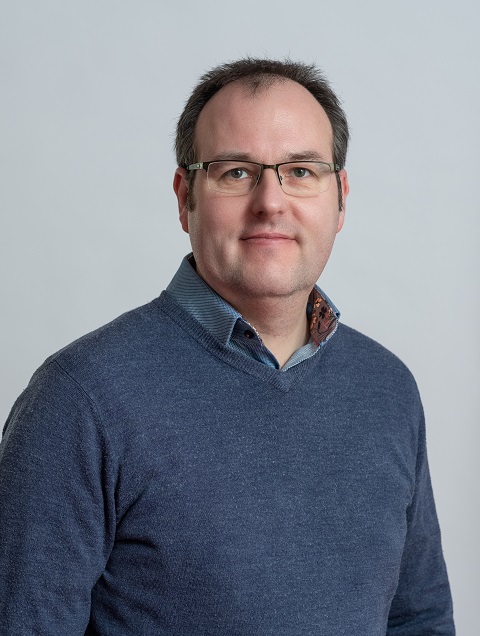Professor Paul Roach is a leading interdisciplinary scientist dedicated to tackling global challenges and advancing fundamental research into the complex interactions between materials and biological systems. His expertise spans synthetic organic chemistry, materials science, experimental physics, and biological responses to surface cues, enabling a truly multidisciplinary approach to scientific discovery.
Prof Roach earned his Ph.D. in Chemistry in 2005, investigating protein-surface interactions and uncovering new challenges in materials chemistry and biological sensing. He then joined Nottingham Trent University as a research fellow in physics, where he designed and fabricated Next-Generation Love Wave acoustic sensors. These innovative sensors, capable of supporting bulk shear and surface waves, enable highly sensitive detection of surface binding events through advanced surface modifications and micro-patterning techniques.
In 2008, he expanded his expertise into the biological sciences, taking on an MRC-funded postdoctoral research role at the University of Nottingham. Working between the Schools of Pharmacy and Biomedical Sciences, he used a combinatorial approach to study how surface cues influence cell behaviour. This work deepened his understanding of plasma polymer systems for modifying cell culture substrates and strengthened his expertise in neural biology.
Prof Roach has led multiple projects focused on the design and fabrication of novel materials and surface coatings, including applications in microfluidic devices. His research explores biomaterials for medical applications as well as the effects of superhydrophobicity on protein adsorption. As a work package lead in the EU-funded Future Emerging Technologies NEU-ChiP project, he has played a key role in developing living biological computing systems—a groundbreaking effort integrating microfabricated human brain cell circuits (derived from iPSCs) with computational modeling of functional networks.
His deep connection to surface science and analytical techniques has also driven close collaborations with the NHS, where he applies vibrational spectroscopy for cancer diagnostics, with a focus on identifying and differentiating cell types for early disease detection. This expertise aligns with his work on microplastics, where he partners with biologists, materials scientists, and geographers to investigate pollution and its impact on cellular health.
Prof Roach’s interdisciplinary approach continues to push the boundaries of scientific innovation, bridging fundamental research with real-world applications that address pressing global challenges.
Research areas
Professor Paul Roach’s research spans chemical and biological surface engineering, as well as the development of innovative instrumentation and materials aimed at revolutionizing healthcare devices and diagnostics. A central focus of his work is cancer diagnostics through vibrational spectroscopy, where he applies advanced analytical techniques to evaluate and differentiate cell types, contributing to the early detection and diagnosis of cancer. Additionally, he is investigating the impacts of microplastics on cellular health, exploring the intersection of pollution and biology through collaborations across various scientific disciplines.
Professor Roach’s expertise in materials science, particularly in advanced materials, biomaterial interface science, nano-bio interactions, and micro-fabrication, allows him to engineer complex cellular models for use in tissue engineering, particularly for the development of neural architectures. He is internationally recognized for his multidisciplinary research, which is reflected in numerous publications and invited talks. His work enables the manipulation of biological responses in vitro, using engineered materials and structures to drive cellular behaviour in a controlled environment.
A significant aspect of Professor Roach’s research focuses on humanized and animal-free research, particularly in the development of brain-on-a-chip devices. These devices offer groundbreaking potential for neuroscience and pharmaceutical applications, eliminating the need for animal models while providing highly relevant human-based systems for studying neural behaviour and disease.
Building on the fundamental chemical principles of surface engineering and biological control at interfaces, Professor Roach leads research in the biomaterials and biofabrication fields. His current focus includes controlling the organization and function of neural cells using engineered materials, with several publications addressing the influence of surface cues and nanoparticle interactions on neural sub-populations.
Key areas of Professor Roach’s research include:
- Micro-/Nano-fabrication
- Designer Biomaterials
- Tissue Engineering
- Neural Engineering and Brain-on-a-Chip Development
- Cancer Diagnostics through Vibrational Spectroscopy
- Microplastics and Health
This multidisciplinary approach is driving forward innovative technologies with the potential to transform healthcare and environmental science, addressing critical global challenges.
Professor Paul Roach is highly active in research, learning, and teaching activities. He has been elected to the UK Society for Biomaterials Council where he served as President for 6 years, before stepping down and taking on the role as Treasurer. He also serves on the executive committee of the Royal Society of Chemistry's Biomaterials Chemistry Special Interest Group.
Professor Roach has led major awards for doctoral training, being a Co-I on the EPSRC/MRC Centre for Doctoral Training (CDT) in Regenerative Medicine (a collaboration between Loughborough, Nottingham, and Keele) and work package lead for the EU-funded Future Emerging Technologies NEU-ChiP project.
As a member of the EPSRC College, Professor Roach was previously a member of the EPSRC Early Career Forum for Manufacturing, linking with industry leaders and fellow academics to shape the research agenda in this field.
He has established extensive international links for both research and teaching, including developing Medical Research Training Programmes with partners in Saudi Arabia. Professor Roach was appointed to an adjunct position at the Donders Institute for Brain, Cognition, and Behaviour, Radboud University, Nijmegen, Netherlands, where he continues to facilitate networking and collaborative research activities.
Previously, Professor Roach was the Director of Loughborough University’s Natural Sciences course, which he established in 2018, alongside assisting with the development of the Uks first Society for Natural Science.
- Programme Director for Natural Sciences
- Module lead for CMB108 – Cell Structure and Biochemistry
- Module lead for CMC007 – Pharmacokinetics and Drug Metabolism
- Project supervisor for CMC026 – BSc Investigative Projects
- Project supervisor for CMD001 – MSci Research Projects
